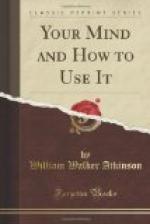The quantity of food to be taken varies with the demands of the individual appetite and the individual powers of absorption. In general, one who is engaged in physical labor needs more, because of increased appetite and increased waste of tissues. So a farm-hand needs more food than a college student, whose work is mostly indoors and sedentary. Much has been said recently about the ills of overeating. One of the most enthusiastic defenders of a decreased diet is Mr. Horace Fletcher, who, by the practice of protracted mastication, “contrives to satisfy the appetite while taking an exceptionally small amount of food. Salivary digestion is favored and the mechanical subdivision of the food is carried to an extreme point. Remarkably complete digestion and absorption follow. By faithfully pursuing this system Mr. Fletcher has vastly bettered his general health, and is a rare example of muscular and mental power for a man above sixty years of age. He is a vigorous pedestrian and mountain-climber and holds surprising records for endurance tests in the gymnasium.
“The chief gain observed in his case, as in others which are more or less parallel, is the acquiring of immunity to fatigue, both muscular and central. It is not claimed that the sparing diet confers great strength for momentary efforts—’explosive strength,’ as the term goes—but that moderate muscular contractions may be repeated many times with far less discomfort than before. The inference appears to be that the subject who eats more than is best has in his circulation and his tissues by-products which act like the muscular waste which is normally responsible for fatigue. According to this conception he is never really fresh for his task, but is obliged to start with a handicap. When he reduces his diet the cells and fluids of his body free themselves of these by-products and he realizes a capacity quite unguessed in the past.
“The same assumption explains the fact mentioned by Mr. Fletcher, that the hours of sleep can be reduced decidedly when the diet is cut down. It would seem as though a part of our sleep might often be due to avoidable auto-intoxication. If one can shorten his nightly sleep without feeling the worse for it this is an important gain.”
But the amount of food is probably not so important as the kind. Foods containing much starch, as potatoes and rice, may ordinarily be taken in greater quantities than foods containing much protein, such as meats and nuts. So our problem is not so much concerned with quantity as with the choice of kinds of food. Probably the most favorable distribution of foods for students is a predominance of fruits, coarse cereals, starch and sugar and less prominence to meats. Do not begin the day’s study on a breakfast of cakes. They are a heavy tax upon the digestive powers and their nutritive value is low. The mid-day meal is also a crucial factor in determining the efficiency of afternoon study, and




